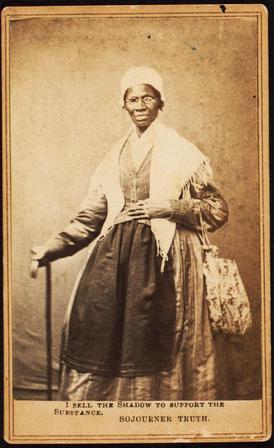Sojourner Truth
In 1797, a baby girl named Isabella was born in upstate New York. Her parents were Elizabeth and James Baumfree, but she was the property of their Dutch master, who sold her off at the age of 9. By the time she was 12, she had been sold two more times. When slavery was outlawed in New York, Isabella was 30 years old, the mother of four surviving children, and finally free to leave. She reached New York City in 1829 and joined the Mother AME Zion Church. Known as a preacher and prophet, she spent 14 years in the city before suddenly declaring, “The Spirit calls me there and I must go.” That day in 1843 she left to travel the land and spread the Lord’s word as Sojourner Truth.
Sojourner Truth traveled throughout New England and as far west as Kansas. When she spoke, everyone listened—even the hecklers. She gave her most famous speech at a women’s rights convention in Ohio. As one there remembered it, the hecklers were hissing but, “At her first word there was a profound hush.” When one man called women “weak,” Truth looked him in the eye and in her low voice said, “I could work as much and eat as much as a man (when I could get it), and bear the lash as well -- and ain’t I a woman?” Another time she stopped the hissing with “…we’ll have our rights; see if we don't: and you can’t stop us from them; see if you can. You may hiss as much as you like, but it is comin’.”
A legend in her own time, Sojourner Truth died in 1883 in Battle Creek, Michigan. Her funeral was said to be the largest ever seen there.
This entry contributed by
Curriculum Concepts International
Related Media
Images

|
While living in New York City, Isabella Baumfree became Sojourner Truth and left her home at 74 Canal Street to spread the “Lord’s truth.” She became a legend in her own time.
|

|
Born a slave in 1797 in Ulster County, New York, Sojourner Truth spoke out against slavery and injustice, and for women’s rights, making people from President Lincoln to street toughs listen. The phrase "I sell the shadow..." often accompanied copies of this portrait, which was sold to raise funds for the anti-slavery cause.
|
